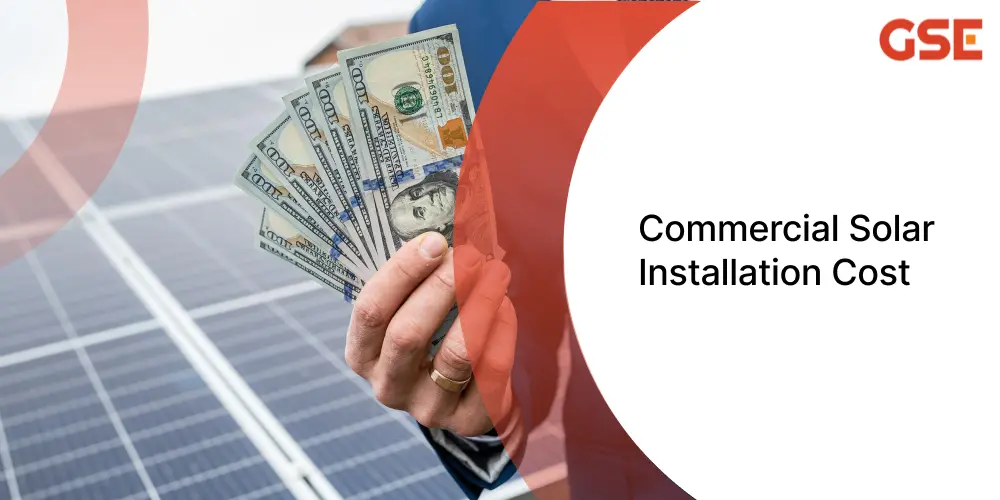ESG & Solar
Apr 28

Solar energy has become a vital source of renewable energy for businesses, helping companies reduce their carbon footprint and lower their energy costs. Commercial solar panels have seen significant growth in recent years as more businesses transition to renewable energy sources. One critical consideration when installing solar panels for business is the cost, as it determines the return on investment (ROI) for the company.
The commercial solar panel price depends on various factors. The size and complexity of the installation, equipment quality, and specific business requirements all play a role in determining the overall cost. Additionally, government incentives, financing options, and maintenance expenses should also be considered.
Understanding the cost of commercial solar energy helps you make informed decisions and maximize the benefits of solar energy for your business. Lets understand the commercial solar panel installation costs in 2024, the factors affecting costs.
Commercial solar panels are designed to convert sunlight into electricity using advanced commercial solar PV panels. Made of silicon solar cells, these panels generate electricity when exposed to sunlight and are typically installed on solar rooftops or nearby lands to maximize sunlight exposure. A commercial solar PV system can significantly reduce a company’s energy costs and carbon footprint, often meeting most of its energy needs. Public infrastructures like schools, hospitals, and libraries also benefit from solar for business, lowering operational costs. In summary, commercial solar panels provide economic and environmental advantages, helping companies save on energy costs and promote sustainability.
Commercial solar panels generate DC electricity from sunlight, which is converted to AC power by a solar inverter to run your business. Surplus power is exported to the grid via net metering, with adjustments reflected in your electricity bill or payments from the government. Commercial solar power panels help business owners reduce operating costs and electricity expenses, making solar power for commercial purposes a sustainable and cost-saving choice.
Read More: How Commercial Solar Panels Work
| System Size | Approximate Cost (INR) | Annual Energy Production (kWh) |
| 100 kW | ₹1,20,00,000 | 136,000 |
| 200 kW | ₹4,00,00,000 | 272,000 |
| 300 kW | ₹6,00,00,000 | 408,000 |
| 400 kW | ₹8,00,00,000 | 544,000 |
| 500 kW | ₹10,00,00,000 | 680,000 |
| 1 MW | ₹20,00,00,000 | 1,360,000 |
Notes:
These estimates provide a general idea of the investment required for different system sizes. The commercial solar installation cost for each system varies, but the significant savings and tax incentives make solar power an attractive option for businesses.Commercial solar panels help reduce operating costs and electricity expenses. By incorporating commercial solar PV panels into their energy strategy, businesses can achieve substantial savings and promote sustainability. Request a free site analysis to determine the specific commercial solar panel price and evaluate the feasibility and return on investment (ROI) for your business.
When considering the cost of commercial solar energy, system size is the primary factor. Larger systems require a higher initial investment, but the cost per watt decreases due to relatively constant expenses. However, installation size is often limited by available roof or ground space, preventing some businesses from achieving 100% offset of their electricity usage.
Several factors affect the total commercial solar panel price:
System Size: Larger systems are more cost-efficient per watt.
Number of Panels Needed: Calculate based on daily power usage and sunlight received using the formula:
Geographical Location: More sunlight hours reduce the number of panels needed.
Mounting System: Costs vary by installation type (roof mount, ground mount, carport) and roof material.
Distance to Interconnection Point: Longer distances require more wiring and infrastructure.
Shade: Shade reduces efficiency, potentially requiring more panels or optimization equipment.
Interconnection Costs: Costs for connecting to the utility grid, including necessary upgrades.
Local Regulations: Varying regulations and permits impact cost and timeline.
Understanding these factors helps businesses make informed decisions when investing in commercial solar panels. By considering all aspects, from system size to local regulations, companies can optimize their investment and achieve significant savings and sustainability benefits.
Many businesses can recover a significant portion of their commercial solar installation cost within the first few years through various incentives:
Using these incentives makes the commercial solar panel cost more affordable, making solar panels for business a financially beneficial choice.
While commercial solar panel installation may seem costly upfront, the return on investment (ROI) often far exceeds the initial expense. Investing in solar panels for business pays for itself through the free electricity generated, reducing high monthly utility bills over time.
Significant tax advantages also help lower the business’s tax burden. The payback period varies, but many businesses achieve it within six to ten years, leaving the rest of the system’s 25+ year lifespan to produce free electricity, resulting in substantial long-term savings.
Considering the commercial solar panel cost and available incentives, the commercial solar installation cost becomes more manageable. The initial commercial solar panel price is offset by long-term benefits, making it a wise investment for reducing operating costs and promoting sustainability.
To accurately determine your commercial solar installation cost with GSE Renewables, start by requesting a custom quote. We’ll provide a detailed installation cost breakdown, a preliminary system design, and information on available incentives to help you maximize savings and benefits to calculate return on investment for solar power for commercial use.
If you’re not ready to request a quote, use our Solar Calculator for an immediate estimate of the cost and savings you can expect. Contact us now for your commercial solar needs and start saving on energy costs today!
The cost of a 100kW solar system in India typically ranges from ₹55 lakh to ₹1.2 crore, depending on factors such as location, equipment quality, and installation costs.
